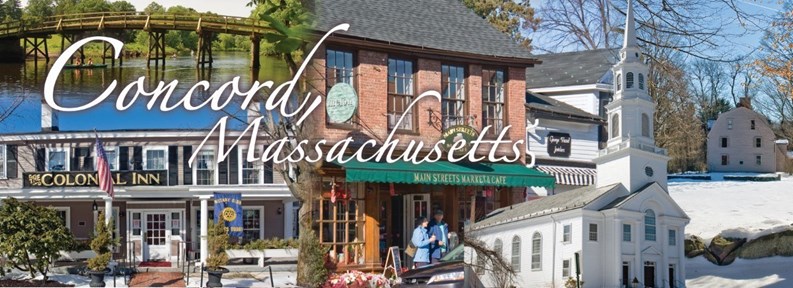When the Puritans bought Muske-taquid from the Algonkians in 1635, they changed the name to "Concord" to signify the harmony of the agreement. The Massachusetts town has lived up to its name ever since, albeit rather unconventionally. Its inhabitants have historically created waves in order to bring about change or what they saw as a better way of life. Today, the town of about 17,000 bustles peacefully on the banks of the Assabet River, and has become a most desirable place to live.
Three Revolutions
As noted at the Concord Museum, the town has been touched by three revolutions. In 1775, "the shot heard round the world" was fired between the British and the Americans on Old North Bridge, and officially began the American Revolution. With Ralph Waldo Emerson's lofty thoughts and Henry David Thoreau's experimental living, a literary and philosophical revolution got under way among the Transcendentalists. These thinkers attempted, in their lives and writings, to comment on the ills of their society and live according to their idea of true spirituality, which they felt was best reached through intuition, rather than doctrine. Concord also contributed to the Industrial Revolution, with its Damon Mill, which provided jobs for many and revenue for the community until the early 1900's.
The most enduring legacy to the town was arguably left by the Transcendentalists. Much of Concord is still wooded, and large areas--notably The Calf Pasture andWalden Pond—are now conservation land. Sleepy Hollow, where Emerson, Hawthorne, and their friends used to escape to commune with nature, has been made into a cemetery and park. It has been kept simple and wild so that others, even today, may seek peace and solitude there. In order to maintain such resources, community organizations exists so that residents may be involved in caring for these spaces.
The Transcendentalists made their mark in the center of town, too. The town center was a hub of activity, the exchange of goods and ideas. Thoreau gave his speech on civil disobedience there, and many other notables voiced their concerns and their thoughts. Today, both Main and Walden Streets still hum with activity harking back to earlier days.
Classic Community
No doubt because of its intellectual heritage, Concord boasts numerous cultural sites and activities. Its museums and historical sites include Minuteman National Historic Park, Orchard House, Walden Pond, The Old North Bridge, and, naturally, the Concord Museum. The Concord Chamber of Commerce proudly states, "The Concord of today continues to foster the arts, having a chorus, orchestra, band, four theater companies, two art centers, museums, historic houses and a theater for the performing arts." A-frame placards stand on street corners proclaiming local orchestra performances, and the theatre prominently announces its next play.
The Concord Free Public Library stands at the end of Main Street's row of cafes and boutiques. The shops on Main Street and Walden Street are everything you could hope for in a classic and historic town. Bookshops abound. Antique shops and high-end clothing boutiques attractively display their wares.
At lunch time, the eateries fill with delicious aromas and the streets fill with small children and their caregivers, on their way home from preschool or daycare. A few hours later their older brothers and sisters can be seen walking home from school. With over a quarter of its population under eighteen years old, Concord is a child-friendly place, with a public school system noted for its excellence, and with several good private schools as well. The presence of children lightens the atmosphere of this historic and somewhat up-market town.
Concord is also strategically located in relation to Boston. It maintains enough of its rural atmosphere to provide something of a retreat from the stress of urbanlife. On the other hand, that urban life is easily accessible if you're looking for it. Lying just 20 miles west of Boston, Concord is served by an MBTA commuter bus, and highways as diverse as I-495, I-95 and routes 2 and 128.
Because of its accessibility to Boston, many Concord residents commute there for work. Still, plenty of people stay right in town to support themselves. Not surprisingly, given its trail-blazing history, Concord is home to many entrepreneurs. Along with the boutique owners and restaurateurs are horse boarders and retirement fund managers. Stephanie M. Stillman, executive director of the Concord Chamber of Commerce, says, "Many jobs center around work at the historical sites and at the many non-profit organizations in the community. Emerson Hospital and its affiliated services is the largest employer in town."
Furthermore, Concord is certainly able to cater to its residents' more up-to-date sensibilities itself. The town's Recreation Department operates on a $3.7 million user-based budget. Traditionally, its primary services have been geared to families with children. The department offers a preschool, a daycare, childcare before and after school, and a day camp. In 2006, the Beede Swim and Fitness Center opened for all, and people are gladly taking advantage of the service—there are already 1,900 memberships, including family and group memberships. Administrator Danner DeStephano says, "Our mission is to provide good service for the community." He further claims that "running the department as retail meanseveryone can be included," as funds are available for scholarships. "No one gets left out," he says.
A Classless Society?
With only a tiny percentage of people in Concord living below the poverty line, it seems that few would be left out in any case. The demographic has shifted from an east/west financial divide to a much more homogeneous level of affluence. A local shopkeeper asserts thatthe population has changed since she was in high school. "It used to be a lot of old money mixed in with everybody else," her friend chimes in. Now, she claims, those living in Concord are people who have worked their way up.Meeting minutes from the December 27, 2007, Board of Assessors meeting acknowledge, "The price of excess land ... is comparatively high relative to othertowns in the state." But at the same meeting, it was noted that Concord's land remained a good value, according to the state Department of Revenue.
According to the town assessor, there are 711 residential condominiums, as compared to 4,621 single-family homes. Lori Cadigan, of Barrett and Company Real Estate, says that low end condominiums in town start at about $300,000,while those at the high end of the spectrum might exceed $1 million dollars. She mentions that co-ops here are "not as common as in the city."
Although Concord has an abundance of old, historic homes, the shopkeeper on Main Street and her friend also maintain that many other vintage buildings have been torn down for new growth. Others are being converted into up-to-date dwellings. The rowhouses on the west side of town, where mill- and other blue-collar workers used to live, are now being remodeled as condominiums. Apartments for rent are also available in town, many with the distinction of having been former carriage houses or other outbuildings belonging to a larger, historic home. Newer developments like Concord Commons offer units of one to three bedrooms, ranging in price from $300,000 to $700,000.
The price for these dwellings may be steep. On the other hand, it is difficult to place a value on culture, history and inspiration. From its riverside proximity to Boston, Concord has been a quiet influence on and expression of the American spirit for centuries. What neweffects this community will have on New England and the country, history and time will tell.







2 Comments
Leave a Comment